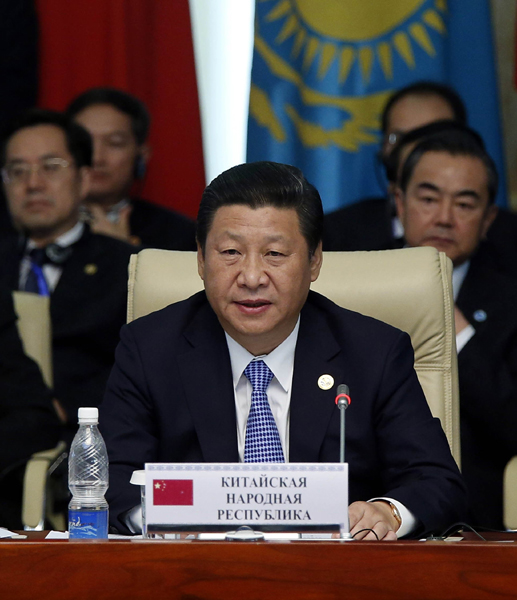SCO: Will expansion mean a change of role?
- By Tim Collard
 0 Comment(s)
0 Comment(s) Print
Print E-mail China.org.cn, October 8, 2014
E-mail China.org.cn, October 8, 2014
Earlier this year, China announced proposals to expand the membership of the Shanghai Cooperation Organization (SCO). President Xi Jinping has said, "The SCO welcomes those countries who are willing and qualified to join the SCO to apply for full membership."
|
|
|
Chinese President Xi Jinping attends the 14th meeting of the Council of Heads of State of the Shanghai Cooperation Organization (SCO) in Dushanbe, capital of Tajikistan, Sept. 12, 2014. [Xinhua] |
Originally founded as an organization to lay the groundwork for economic and strategic cooperation between the major powers in Northern Asia - Russia and China - and the smaller central Asian states which formerly belonged to the Soviet Union, the SCO has proposed extending full partnership to states which have previously attended meetings as observers: India, Pakistan, Iran and Mongolia. (Afghanistan, another observer, is also a possible future member.) This announcement came after an SCO meeting in June 2014 in Dushanbe. It was also suggested that the SCO might be merged with the existing Collective Security Treaty Organization (CSTO), which includes Russian allies Armenia and Belarus as well as four SCO members, though this is still being debated.
What effect might the proposed expansion have? Clearly, a multilateral cooperation agreement aimed at establishing economic and trading links across Asia would benefit from involving the maximum number of regional partners to create stronger synergy. As there are also many long-standing security problems across the continent - the rise of terrorism prominent among them - a multilateral security structure also makes sense. But there could be problems lurking in the fine details of this optimistic and constructive initiative.
To begin with, it has been indicated that the first countries likely to be admitted to an expanded SCO are India and Pakistan. This makes sense economically, particularly to the landlocked Central Asian countries of the original SCO which will thus have easier access to the ports of the sub-continent. But from a security point of view, there will be major difficulties with this plan. India and Pakistan are locked in what appears to be a permanent dispute, and both countries have a tendency to regard security issues as a zero-sum game, where what benefits one will harm the other. This may cause problems for the SCO's ethos of mutually beneficial cooperation.






